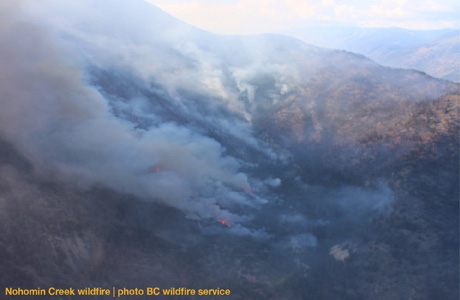Reports
You are here
Climate disaster strikes Lytton, BC for the 3rd time in a year

July 19, 2022
One year ago Lytton, BC surpassed the highest record temperature for any location north of the 45th parallel. During that 500C degree day a wildfire broke out and consumed the town in minutes.
The Lytton First Nation faced extensive damage to homes and property during that fire. Five months later, record rain-falldropped a month’s worth of rain in three days across much of British Columbia. All highways connecting the coast to the rest of BC and Canada were severed by the flooding. Lytton and its surroundings faced extreme flooding as well.
Once again Lytton and the Lytton First Nation are in danger from a wild-fire. The Nohomin Creekfire is classified as “Out of Control,” by the BC Wildfire service. This classification means that, “the wildfire is continuing to spread and is not responding to suppression efforts.” Having spread to over 17 km2, it has also burned 10 buildings, over 130 people have been evacuated so far, and there are several evacuation alerts in place. The fire occupies more area than the entire city of New Westminster.
This fire started last Thursday, only ten days after the Lytton First Nation rescinded the evacuation orders for all but three of the 39 reserves that were evacuated due to the fire last June. In addition to the immediate danger from the fire, a much larger region is suffering due to the smoke spreading along the Fraser canyon. Wildfire smoke leads to an increase of premature deaths from many causes in addition to respiratory disease.
Climate emergencies are increasing in frequency and in devastation. The areas around Lytton have experienced fires and floods and fires again all within a year. Each catastrophe has interfered with efforts to build back from the previous one. When we look at Lytton, we look at the future for us all as increased exploitation of fossil fuels dumps more and more greenhouse gasses into the air.
The BC NDP government seems determined to press down the accelerator as we travel towards extinction.
Since they formed government in 2017 natural gas production in BC has increasedfrom 42.2 billion m3, to 60.7 billion m3 in 2021. This 44% increase, by itself, is the greenhouse gas equivalentof adding 7.7 million more cars on the road. That’s more than three times the 2.6 millionpassenger vehicles in the province.
The NDP has recently completed an oil and gas royalty review. The conclusion of the review is to keep more than $4 billion in subsidiesfor oil and gas extraction in the province. This is in addition to the millions spent on policing to arrest over a thousand protesters defending old growth forests from logging and a military style occupation by the RCMP of Wet’suwet’en. The RCMP invasion of Wet’suwet’en has included the arrest and criminal charges against dozens of Indigenous land defenders.
******
Scientists have been warning about these scenarios for decades. But governments and corporations have stalled or reversed efforts to slow climate change to make even more money for the already rich in the fossil fuel industry.
The rest of the globe is in no better shape. Heatwaves and wildfires are widespread across Europeand most of Southern Eurasia and Africaare in the depths of prolonged drought and soaring temperatures.
Canada is one of the main contributorsto greenhouse gas emissions but politicians of all stripes are lining up to expand oil and gas production and to build new pipelines.
A movement that combines the call for Indigenous Sovereignty,climate justice and a just transition for workers is crucial if we are going to reverse the tide.
Section:










